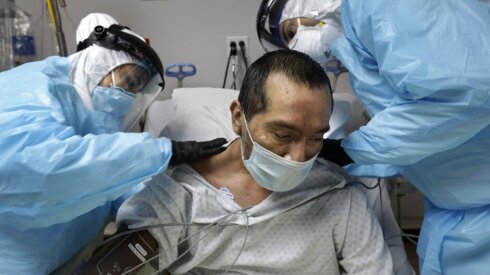Latest News
The pandemic assistance plan includes more than $2.1 billion in grants and fee waivers for small businesses as well as $600 stimulus payments for residents with an annual salary of $30,000 or less.
With COVID-19 vaccine in short supply, more people are turning to social media for useful information as they scour the Internet for available immunizations. And they are getting it.
QR code use is growing as a convenient input mechanism to make mobile transactions more efficient. But Qshing, or QR code abuse, is also becoming a cyberthreat.
New Jersey officials are urging claimants to visit a tip sheet to better understand the federally mandated questions before filing for unemployment, otherwise they may wait for weeks for their eligibility to be cleared.
California awarded the contract for a 65-mile segment of the bullet train route to a company that promised $300M in savings. Now, the cost-saving designs have been changed and the project will run $800M over budget.
Tennessee has only tested 0.02 percent of the state’s positive COVID tests to see if they’re the variant strains. But to increase the testing, assistance from community partners and more funding is needed.
A new state transportation proposal would fund road improvements and offset revenue losses caused by the pandemic, but it would require increased fees on gas, bikes, public transit, ferries and ride-hailing trips.
This session, Republican lawmakers have introduced five election-related bills regarding citizenship, recount requests and repealing automatic mail ballots. Democrats say the proposals are voter suppression tactics.
With an offshore wind turbine complex under construction, the state has set up a unique training school for future technicians, who are learning their trade in an old mill town in need of revitalization.
The president's plan would send tens of billions in unrestricted aid to states, including those holding up well. Aid from Washington should target preserving basic services and fighting the pandemic.
A few of them have worked out well. Most of them have been failures. But the idea of building new ones has never died, and there are signs of still another incarnation.
An urban air mobility company, Blade, has plans to establish an air taxi service between downtown Chicago and O’Hare Airport. The service would use an electric-powered helicopter and would take only 5 minutes.
Though COVID-19 has led to record unemployment numbers across the nation, a study found the cause was more dependent on the number of COVID-related deaths than it was the restrictions imposed on businesses.
The Senate Committee on General Laws and Technology voted to advance a bill that would require law enforcement to release criminal investigation files in an effort to improve police transparency.
The Cuomo administration is being investigated for mandating that nursing homes accept residents released from the hospital even if they tested positive for COVID-19.
In nine states, some jurisdictions have allowed voting via computer or app.
Maryland made history last week, becoming the first state in the country to codify a tax on digital ads. The move would have a significant financial impact on big tech, but the bill will probably face multiple legal challenges.
Licensing requirements preventing physicians from practicing across state borders have been relaxed during the pandemic. Utah's approach points the way to a more sensible permanent licensing regime.
San Fernando, Calif., will establish 14 superchargers in a city-owned parking structure near the downtown area to hopefully encourage visitors to stop into the small, largely Latino town and revitalize the area.
An October cyberattack on Chatham County’s computer network tried to extort $2.4 million, but the North Carolina county refused to pay. An investigation found the hackers posted personal data for sale on the “dark Web.”
The widely praised law mandated that a 22-member committee meet by Monday, Feb. 15 to discuss law enforcement use of facial recognition technology. As of Tuesday, the committee had yet to be established.
The City Council has authorized $977,000 to help local organizations combat the financial damages of the pandemic. Since April, the city has already approved $3.25 million for COVID response.
Millions of Texans are without power as temperatures dropped into the single digits across much of the country. To prevent future outages, states may need to speed their shift toward renewable energy sources.
Cities have always gotten less than their share from states. As they've become wealthier and more Democratic, they've come increasingly under attack.
The printing press and social media democratized communication in their respective times. They both turned the order of things on its head — for good, for ill, and forever.
The route to trust in our institutions is through candor, competence and a clear sense of mission. Two examples, from Indiana and West Virginia, show how trust can be rebuilt one careful step at a time.
Slab City, a do-it-yourself, free-wheeling community, has been functioning to some degree for decades. Without any infrastructure or civic institutions, such as police or fire services, it exists by defying normalcy.
Congressional Democrats are pushing the $1.9 trillion package, including stimulus checks, extended unemployment benefits and monthly payments to parents, ahead before pandemic protections expire. Republicans say it’s too expensive.
Just 18.5 percent of Iowans have access to affordable Internet and the average download speed is the second worst in the nation. But Gov. Reynolds hopes to get Iowans connected over the next three years.
Washington state’s vaccine plan failed to include basic logistics that would enable quick distribution to vulnerable communities. Now, the state must rebuild trust in the system that left many out.
Sponsored
-
Sponsored
Most Read






























